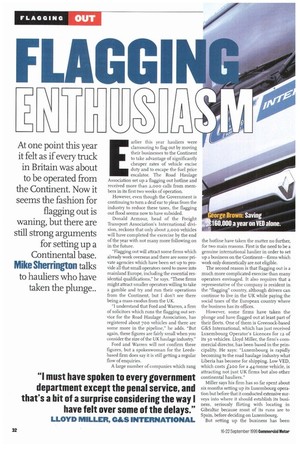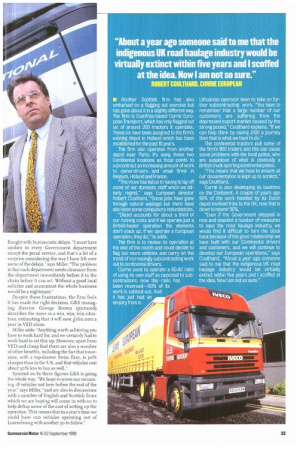F,!. L ;11,GG
Page 36

Page 37

If you've noticed an error in this article please click here to report it so we can fix it.
At one point this year it felt as if every truck in Britain was about to be operated from the Continent. Now it seems the fashion for flagging out is waning, but there are still strong arguments for setting up a Continental base.
Mike Sherrington talks to hauliers who have taken the plunge.. Earlier this year hauliers were clamouring to flag out by moving their businesses to the Continent to take advantage of significantly cheaper rates of vehicle excise duty and to escape the fuel price escalator. The Road Haulage Association set up a flagging out hotline and received more than 2000, calls from members in its first two weeks of operation.
However, even though the Government is continuing to turn a deaf ear to pleas from the industry to reduce these taxes, the flagging out flood seems now to have subsided.
Donald Armour, head of the Freight Transport Association's International division, reckons that only about 2,000 vehicles will have completed the exercise by the end of the year with not many more following on in the future.
"Flagging out will attract some firms which already work overseas and there are some private agencies which have been set up to provide all that small operators need to move into mainland Europe, including the essential residential qualifications," he says. "These firms might attract smaller operators willing to take a gamble and try and run their operations from the Continent, but I don't see there being a mass exodus from the UK.
"I understand that Ford and Warren, a firm of solicitors which runs the flagging out service for the Road Haulage Association, has registered about 700 vehicles and there are some more in the pipeline," he adds. "But again, these figures are fairly small when you consider the size of the UK haulage industry."
Ford and Warren will not confirm these figures, but a spokeswoman for the Leedsbased firm does say it is still getting a regular flow of enquiries.
A large number of companies which rang the hotline have taken the matter no further, for two main reasons. First is the need to be a genuine international haulier in order to set up a business on the Continent—firms which work only domestically are not eligible.
The second reason is that flagging out is a much more complicated exercise than many operators envisaged. It also requires that a representative of the company is resident in the "flagging" country, although drivers can continue to live in the UK while paying the social taxes of the European country where the business has its offices.
However, some firms have taken the plunge and have flagged out at least part of their fleets. One of them is Greenock-based G&S International, which has just received Luxembourg Operator's Licences for 12 of its 30 vehicles. Lloyd Miller, the firm's commercial director, has been based in the principality. He says: "Luxembourg is rapidly becoming to the road haulage industry what Liberia has become for shipping, Low VED, which costs L200 for a 44-tonne vehicle, is attracting not just UK firms but also other continental hauliers."
Miller says his firm has so far spent about six months setting up its Luxembourg operation but before that it conducted extensive surveys into where it should establish its business, seriously flirting with locating in Gibraltar because most of its runs are to Spain, before deciding on Luxembourg.
But setting up the business has been fraught with bureaucratic delays. "I must have spoken to every Government department except the penal service, and that's a bit of a surprise considering the way I have felt over some of the delays," says Miller. The problem is that each department needs clearance from the department immediately before it in the chain before it can act. Without a good local solicitor and accountant the whole business would be a nightmare."
Despite these frustrations, the firm feels it has made the right decision. G&S managing director George Brown (pictured) describes the move as a win, win, win situation, estimating that it will save L16o,000 a year in VED alone.
Miller adds: "Anything worth achieving you have to work hard for, and we certainly had to work hard to set this up. However, apart from VED and cheap fuel there are also a number of other benefits, including the fact that insurance, with a top-drawer Swiss firm, is 30% cheaper than in the UK, and that vehicles cost about 30% less to buy as well."
Spurred on by these figures G&S is going the whole way. "We hope to move our remaining 18 vehicles out here before the end of the year," says Miller, "and are also in discussions with a number of English and Scottish firms which we are hoping will come in with us to help defray some of the cost of setting up the operation. This means that in a year's time we could have TOO vehicles operating out of Luxembourg with another 50 to follow,"










































































































